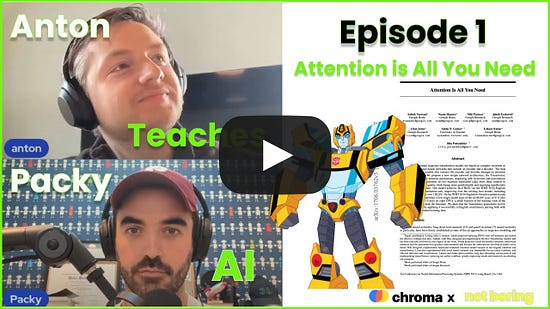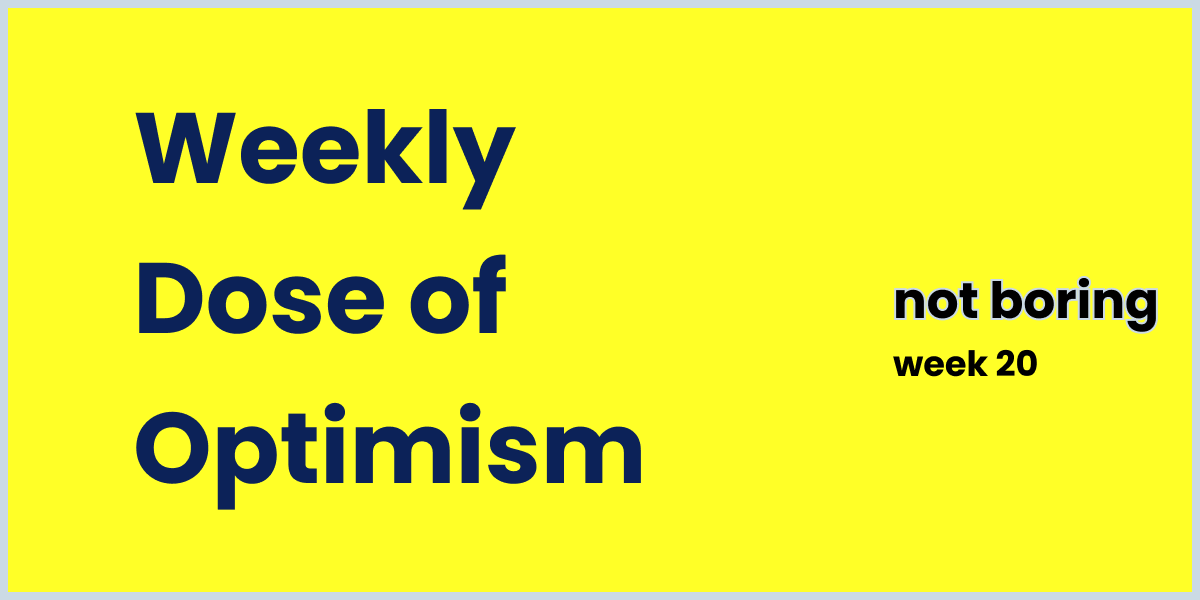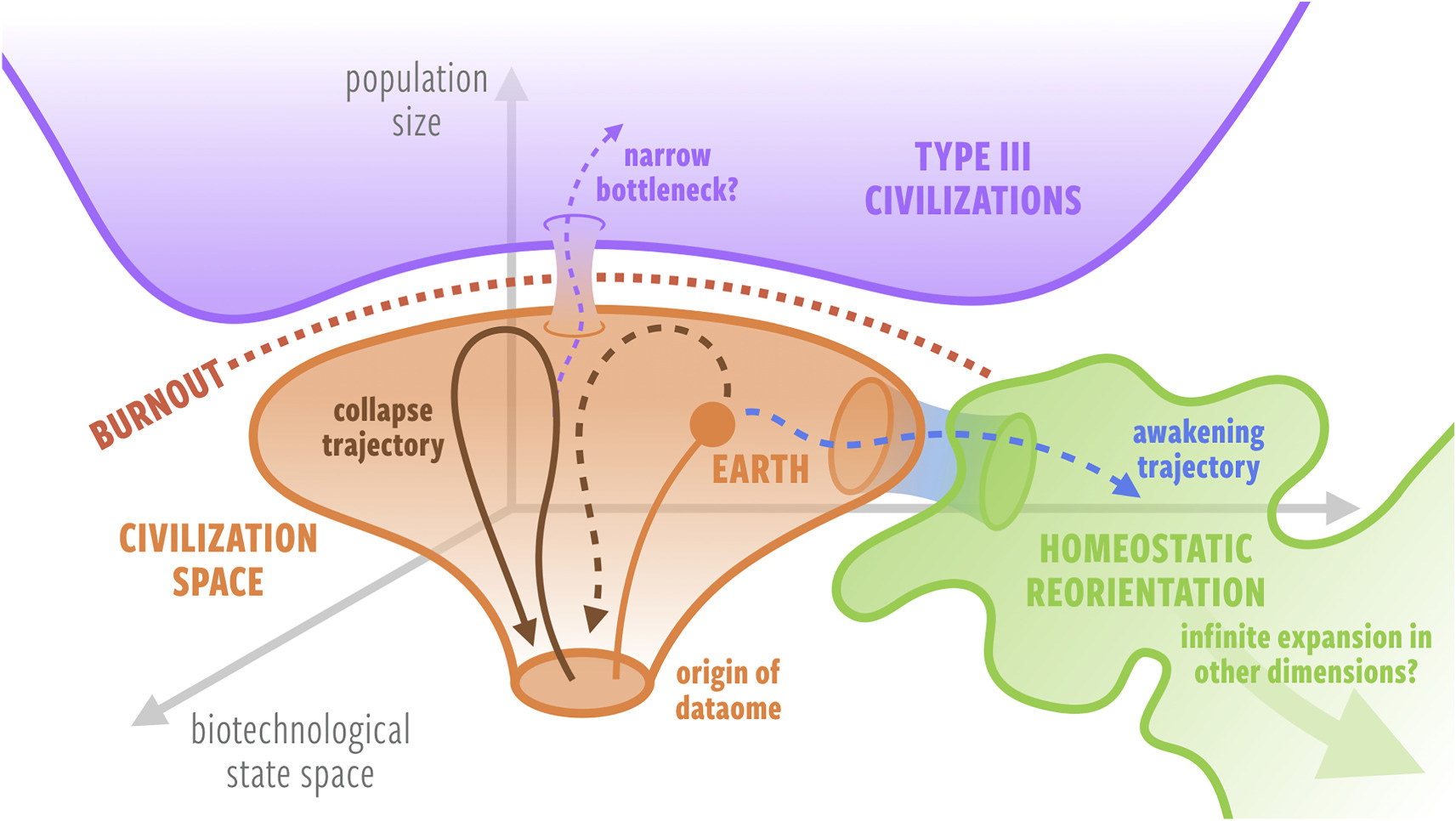Not Boring by Packy McCormick - Weekly Dose of Optimism #20
Weekly Dose of Optimism #20UN Poverty Report, Abundance Recommendations, Blended Meat, Binge Eating, and Thought-to-Speech Interfaces, Anton Teaches Packy AIHi friends 👋, Happy Friday and welcome to our 20th Weekly Dose of Optimism. That’s 20 straight weeks of optimism dropped into your inbox. Here’s to hoping the world gives us the content we need for the next 20! Let’s get to it. The Weekly Dose is brought to you by…Athletic Greens We convinced the team over at Athletic Greens to give us an exclusive offer for our audience (legitimately, not the way people normally say that): 10 Free Travel Packs when you subscribe. At this point you probably are familiar with Athletic Greens — it’s the easiest way to get your daily nutrients. I start every morning with a special AG1 concoction. I started taking it when my brother Dan gifted it to me two Christmases ago…which leads me to my next point: it makes a great gift. So whether you want to boost your morning routine or give a standout gift this holiday season, check out our exclusive offer below: (1) Lifting 100 million out of poverty by 2025 still possible, despite recession threat From The United Nations
This report from the UN was released a few weeks ago, but the staggering stat of 415 million people in India being lifted out of poverty over the past 15 years is still making the rounds on the internet. 415 million people — holy shit! That means that over the past 15 years, more than one United States’ worth of people have seen a meaningful, measurable quality of life improvement just in India. There is much work to be done, both in India and the rest of the world. In India, for example, 10% of the population — or about 140 million people — still live in poverty. But despite Covid-induced setbacks, the UN believes it’s well on its way to lifting an additional 100 million people out of poverty by 2025, due to a combination of integrated poverty reduction strategies such as sanitation, decarbonization, and nutrition programs. (2) What Policies Promote Abundance? From The Center for Growth & Opportunity
At Not Boring, we’ve written extensively on the Abundance Agenda — it’s the idea that we can (and need to) increase accessibility to essential goods by increasing supply, which means more (and cheaper) energy, production, and infrastructure. But how do we make it happen? It will require deep cooperation between government, industry, and academia. The government’s role is to reduce unnecessary red tape and provide funding, academia provides the foundational R&D, and industry commercializes and scales. The Center for Growth & Opportunity at Utah State University is one of the leading research centers publicly advocating for the Abundance Agenda, and it recently published a list of abundance recommendations to Congress. The authors group the recommendations into three buckets:
The future is bright if the government, academia, and industry all pull in the same direction. The full piece is well worth the read for more detail on all of the above. (3) The promise of cultivated meat Joshua March for Noahpinion
People like meat. As more people are lifted out of poverty, more people will want to eat meat. Whether that “meat” is going to come from animals, plants, or a lab remains to be seen, but the planet is in trouble if it all needs to come from animals. “Cultivated meat” — a methodology first commercialized by Memphis Foods (now Upside Foods) in which meat is cultivated from animal cells in bioreactors, is one promising source of that meat. The problem, historically, with meat alternatives is that the product either doesn’t actually taste like meat (plant), doesn’t have the structure of meat we’re used to eating (cultivated), or is too expensive to produce (both). March, the president of SciFi Foods, lays out an alternative methodology that is meant to solve each of these problems: blended meat. Blended meat combines the flavor benefits of cultivated meat and the structural characteristics of plant-based meats. There are definitely still challenges to this approach — cost, mass appeal, etc. — but more (clean, healthy, non-animal-harming) meat is an agenda we can get behind. (4) Pulses to Their Brains and 2 Women’s Binge Eating Went Away Gina Kolata for The New York Times
Obesity is frustrating. It’s a seemingly very solvable problem, both at the individual level and the population level. Eat less! Eat healthier! Burn more calories than you are putting in your body! But it’s obviously not so easy: over 40% of the U.S. population is obese. Obesity, simply speaking, is caused by eating too much and moving too little. Why people eat too much or move too little can be explained by dozens of different factors including: food costs and accessibility, lifestyle choices, medical conditions, and more. About 3% of the population suffers from an eating disorder called “binge eating.” A small-scale study is using deep-brain stimulation — a methodology generally used to treat Parkinson’s patients — to curb the mental (and physical) urge to binge eat. While only two women participated in the study, they both reported no longer feeling the irresistible urge to binge. Scaling the treatment to the general population could take years, but the findings offer an interesting view into the mind-body connection and an opportunity to curb the obesity epidemic. (5) Online internal speech decoding from single neurons in a human participant From Sarah Wandelt et al  Super excited to share a preprint! At @Caltech, we build the first closed-loop brain-machine (#BMI) interface that is able to decode internal speech 💭. Check it out here: medrxiv.org/content/10.110…
We’re one step closer to the future imagined by Tim Urban in The Brain’s Magical Future. A team at Caltech has devised a way to translate internal words into speech. Think a word in your head — now imagine a machine speaking that word out loud…that’s kind of how it works. Like Urban imagined, this type of BMI technology will likely help people suffering from diseases or injuries first. Imagine an ALS patient — she has full mental faculties but no ability to speak — using the BMI to communicate her needs to a nurse. And while initial use cases will likely be limited to medical treatment, you can imagine a world in which our brains are communicating synchronously with a variety of different systems that give us augmented superpowers. BONUS 1: Thinking Together Gordon Brander
It’s been a brutal week for crypto. FTX, which sponsored this newsletter and podcast and seemed to be one of the safest companies in the space, collapsed after using customer deposits to prop up its sister hedge fund, Alameda. There’s nothing good about the situation; it was fraud. A lot of people are reflecting on whether and why they should care about crypto anymore after another high-profile ponzi. For me, it’s projects like Noosphere, a protocol for thought that aims to help people think together in order to solve the world’s most pressing and complex challenges. In this piece, Gordon makes the case that we've created more information than we can make sense of with our current tools, and that the future of civilization depends on our ability to get our arms around our information environment. To pull it off, we’ll need open protocols that can respond to the complexity of that environment, and tools that merge human and AI capabilities to think better together. I’m excited to see what Noosphere pulls off, and to use the product. BONUS 2: Anton Teaches Packy AI On Monday, we dropped the first episode of Anton Teaches Packy AI on Youtube. The series is meant to demystify AI for curious, but not overly technical folks…like me! As of writing, we already have 420 (nice) subscribers to our Youtube channel and we’re looking to grow our following and put out more video content. The channel will be a combination of Anton Teaches Packy AI, Not Boring Founders video podcasts, and presumably other content best suited for video. If that’s something you’re interested in, SMASH THE SUBSCRIBE BUTTON.  That’s all for this week. If you enjoyed this edition, we’d really appreciate if you shared it with a friend, family member or colleague. We’ll be back in your inbox 9am EST on Monday morning. Enjoy the weekend. Packy |
Older messages
Atoms Are Local
Monday, November 7, 2022
Elliot on the biologization of industry, PLUS Anton Teaches Packy AI
Weekly Dose of Optimism #19
Friday, November 4, 2022
Meta's Protein, It's Time to Space, Nuclear Brief, RSV Vaccine, Stripe Layoffs, AI Portraits
Capital & Taste
Monday, October 31, 2022
Meet the Company Formerly Known as Party Round
Weekly Dose of Optimism #18
Friday, October 28, 2022
The Crypto Story, IEA Calling Top, Data Lasers, Schumpeter's Workout Plan, ML-Powered Drug Discovery, Bleeding Edge AI
Formic: Automating Abundance
Monday, October 24, 2022
Why Robots are good, actually, and how Formic is accelerating their adoption
You Might Also Like
Discover a preview of the content keeping Digiday+ members ahead
Thursday, February 27, 2025
Digiday+ members have more ways than ever to stay ahead of the news and trends transforming media and marketing. Explore premium content from our editors below, including weekly briefings, research and
See you in Boston?
Thursday, February 27, 2025
...back in person for the first time since 2019! Exploding Topics Logo Presented by: Semrush Logo You follow Exploding Topics because you want to get an edge on your competition. Now take that
Why I'm doubling down on my community in 2025... (free bonus)
Thursday, February 27, 2025
Hi there 2025 is chugging along (it's almost March!) – and there's a ton going on right now. But there's something that hasn't changed. Your agency still needs a constant stream of new
Programmer Weekly - Issue 243
Thursday, February 27, 2025
February 27, 2025 | Read Online Programmer Weekly (Issue 243 February 27 2025) Welcome to issue 243 of Programmer Weekly. Let's get straight to the links this week. Streamline IT management with
🎙️ New Episode of The Dime China Tariffs & The Next Era of Vapes: Impact on Supply Chains & Brands ft. Nick Kovacevich
Thursday, February 27, 2025
Want to be featured on The Dime Podcast? Scroll to the end of this email to find out how. Listen here 🎙️ China Tariffs & The Next Era of Vapes: Impact on Supply Chains & Brands ft. Nick
80% less time on social reporting sound good?
Thursday, February 27, 2025
Get Forrester's Total Economic Impact™ of Sprout. ͏ ͏ ͏ ͏ ͏ ͏ ͏ ͏ ͏ ͏ ͏ ͏ ͏ ͏ ͏ ͏ ͏ ͏ ͏ ͏ ͏ ͏ ͏ ͏ ͏ ͏ ͏ ͏ ͏ ͏ ͏ ͏ ͏ ͏ ͏ ͏ ͏ ͏ ͏ ͏ ͏ ͏ ͏ ͏ ͏ ͏ ͏ ͏ ͏ ͏ ͏ ͏ ͏ ͏ ͏ ͏ ͏ ͏ ͏ ͏ ͏ ͏ ͏ ͏ ͏ ͏ ͏ ͏ ͏ ͏ ͏ ͏ ͏ ͏
Social proof in email marketing, National Toast Day, and the art of CTAs
Thursday, February 27, 2025
The latest email resources from the Litmus blog and a few of our favorite things from around the web last week. ͏ ͏ ͏ ͏ ͏ ͏ ͏ ͏ ͏ ͏ ͏ ͏ ͏ ͏ ͏ ͏ ͏ ͏ ͏ ͏ ͏ ͏ ͏ ͏ ͏ ͏ ͏ ͏ ͏ ͏
Python Weekly - Issue 688
Thursday, February 27, 2025
February 27, 2025 | Read Online Python Weekly (Issue 688 February 27 2025) Welcome to issue 688 of Python Weekly. We have a packed issue this week. Enjoy it! The #1 AI Meeting Assistant Summarize 1-
Free download: 5 ways to improve your proposals
Thursday, February 27, 2025
A free resource for you ͏ ͏ ͏ ͏ ͏ ͏ ͏ ͏ ͏ ͏ ͏ ͏ ͏ ͏ ͏ ͏ ͏ ͏ ͏ ͏ ͏ ͏ ͏ ͏ ͏ ͏ ͏ ͏ ͏ ͏ ͏ ͏ ͏ ͏ ͏ ͏ ͏ ͏ ͏ ͏ ͏ ͏ ͏ ͏ ͏ ͏ ͏ ͏ ͏ ͏ ͏ ͏ ͏ ͏ ͏ ͏ ͏ ͏ ͏
From living in a car to $1.4M in 5 months
Thursday, February 27, 2025
I love that you're part of my network. Let's make 2025 epic!! I appreciate you :) Today's hack From living in a car to $1.4M in 5 months Taro Fukuyama and 2 of his friends from Tokyo





